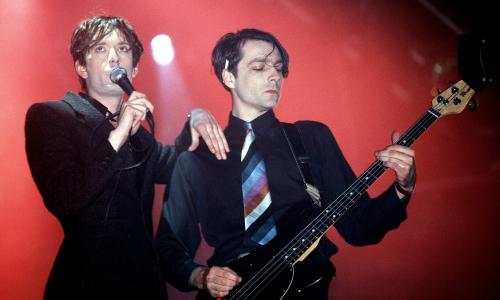Jarvis Cocker has packed a lot into his 55 years. For 26 of them he fronted Pulp, who created one of the genuinely era-defining songs of the 1990s with Common People. He made seven albums with Pulp, has made two solo albums and written songs for the likes of Marianne Faithfull and Charlotte Gainsbourg. Other extra-curricular activities range from appearing on Question Time to starring in Harry Potter and the Goblet of Fire. But it’s not enough.
“My output isn’t as much as I would have hoped,” he says, softly. “I’ve always felt that.”
We are in a small, darkened dressing room in Leith theatre, Edinburgh, where Cocker – outsize glasses, double corduroy and Yorkshire Tea – is adding another string to his bow fronting Jarv Is, the first new band he has formed since starting Arabicus Pulp in 1978 at school in Sheffield.
From 2010 until 2017, Cocker was a BBC 6Music DJ. He loved being able to inflict on the general public the peculiar records from his basement that he normally played only to himself or friends. A new compilation – Music from Jarvis Cocker’s Sunday Service – brings some of them together. Sheffield electronic pioneers Cabaret Voltaire nestle alongside 1960s Leeds singer-songwriter Jake Thackray. Antony and the Johnsons’ haunting version of Beyoncé’s Crazy in Love appears alongside a Trinidadian steel band’s strangely mesmeric remake of Gary Numan’s Cars.
“I half-jokingly said I wanted to bring the boredom back to Sunday afternoons,” he chuckles, but notes that he is old enough to remember when Sunday afternoons were boring and “you had to make your own entertainment, and really think about it”. So, he played “the sort of records that you’d never hear on the radio or anywhere really. Mellow music and spoken-word stuff people could let flow through their mind.”
The problem was, he kept feeling an urge to make more music.
“I’d hesitate to describe it as a calling or whatever,” he says, “But at the back of my mind I felt like I was moonlighting from what I should be doing.” So, in 2017, he pulled the plug on his DJing.

First, he made an album with Canadian pianist Chilly Gonzales and worked on solo songs on a computer, but it wasn’t happening until he realised it was “blindingly obvious that having been in bands since I was 14, I needed to work with other people, get everybody in a room and say: ‘This is how it goes. Join in.’”
Ironically, the Sunday Service led partly to the forming of Jarv Is. Cocker was diligently rooting through CDs to play on the radio when he came across one by harpist Serafina Steer. He really liked it, went to see her, produced an album for her and now she is in his band. Steer recommended her bandmate Emma Smith (violin) and before he knew it, Jarv Is were a six-piece.
Cocker says the Jarv Is songs – which have been going down a storm at festivals – are different to Pulp’s. “In the past, there was a firm narrative,” he says, perhaps thinking of Common People’s tale of a rich girl slumming it or Sorted for E’s and Wizz’s askance look at rave culture (“Oh, is this the way the future’s meant to feel / Or just 20,000 people standing in a field?”). “I wanted to make them slightly more open-ended and allow people to make their own interpretations.”
Thus, Am I Missing Something? (about “getting to a stage in life and thinking: ‘Is this it?’”) may or may not channel his own feelings of a lack of fulfilment. I Am Pharoah is “a song about tourism from the perspective of a human statue”; at some gigs they have performed the track alongside one of the painted, motionless and silent street artists that Cocker approached on London’s South Bank, leaving notes with his phone number until one – who paints himself in diagonal stripes – finally responded. Performing alongside him is, Cocker says, “strangely calming”.
Cocker has always firmly believed that being popular doesn’t mean you can’t be off-kilter. Writing a book about creativity – This Book is a Song, which is due out next autumn – made him think about where his ideas about pop music came from. “And really they were from having listened to the radio for as long as I can remember.”
He describes recording his 2009 solo album Further Complications with Nirvana/punk producer Steve Albini, who was “aghast” when Cocker told him he loved pop. “He looked at me like it was the devil’s music. Cos obviously from his point of view it was everything that ruined music.” But Cocker loves the fact that “really strange records” such as Laurie Anderson’s O Superman, which, despite being unashamedly avant garde, got to No 2 in the UK in 1981, used to be able to “capture the public’s imagination and get in the charts by the democratic act of people ‘voting’ by buying them”.
Cocker blames the death of the singles chart he loved on its late-90s manipulation by record companies, who would price CD singles at 99p on the week of release, then £3.99 thereafter: “Records would go in at No 1 and disappear the next week because nobody would pay full price.” He admits to being “totally out of touch with pop music – or what people call pop now” and says that streaming “has been an interesting thing to get my head around”. Initially, Jarv Is weren’t going to make records at all. They would be a live phenomenon, the idea being: “If people wanted to hear these songs, they would have to be there in the moment, because that’s it.” But they started selling their single Must I Evolve? (recorded live in a cave near Sheffield called the Devil’s Arse) at gigs and, gradually, Cocker has come around because: “The perfect recording of the perfect pop song is still my holy grail.”
Live, Jarv Is throw in the odd Pulp rarity but having put the band to bed with a reunion tour in 2011 he is in no rush to trade on old glories. He quickly grew disillusioned with fame and excess (“a lot of stuff which was detrimental to actually being creative,” he says, drily) and refers to the band’s final years as “the bad old days”.
One incident from the period has followed him around – the time he invaded the stage at the 1996 Brit Awards, wiggling his bottom in protest at Michael Jackson’s performance, in which the star adopted Christ-like poses and surrounded himself with children. I tell him that after the abuse allegations in Leaving Neverland, the incident seems eerily prophetic, but Cocker insists he didn’t watch the film and “really doesn’t want to talk about it”. Doesn’t he feel somehow vindicated? “I don’t, because I didn’t watch it.”

He is more comfortable addressing how his 2006 song Cunts are Still Running the World has become a touchstone in the Jarv Is live set. Audiences bellow the chorus and each night he introduces it by noting “it feels even more relevant now”.
“A strangely common aspect of people that get in power at the moment is that they’re these weird characters – ridiculous people in a way – but people seem to find entertainment in that. And that’s dangerous really. Politics has turned into Game of Thrones and they like all the skulduggery and stabbing people in the back. I can’t see it ending well.”
As a vocal remainer from a city that narrowly voted leave, Brexit hurts him deeply. “The UK has always been divided but we’ve always got on,” he sighs. “But now, whatever happens, half the people are going to be kinda livid about it.”
However, Cocker retains faith in, well, common people. He points out that Cunts Are Still Running the World now ends positively with the line “but not for long”, and on a recent trip to the US – “a country that, if you look through the prism of the media, you think ‘Jesus Christ’” – he was reminded that “most people are, you know, lovely. It’s the political landscape that needs to shift.”
To this end, Jarv Is concerts feature an Extinction Rebellion stall, at Cocker’s request. “I hate to say this because I’ve voted Labour all my life, but both Conservative and Labour currently seem outmoded, in a way. They were born in a time when there was a big working class in factories, who were dying at 35. And they needed someone to stand up for them. Other people thought that was fine. But there’s the start of a different agenda. You’ve got people who want to rape and pillage the Earth and other people who say: ‘Let’s conserve it, otherwise we won’t have anywhere to live.’ So that’s the battle now.”
There is a knock at the door. Cocker has a meal to eat, a gig to play, Extinction Rebellion to meet with. The last time we spoke, towards the end of Pulp, he was thoroughly fed up. Is he enjoying all this again?
“I am,” he smiles as he gets up. “Of course, now that I’ve said that I’ll probably fall off stage.”
Music From Jarvis Cocker’s Sunday Service is released on Ace Records on 27 September




















![[Book Review] The Blade Itself (The First Law Trilogy) by Joe Abercrombie](https://bendthekneegot.com/wp-content/uploads/2018/01/1516047103_maxresdefault-218x150.jpg)

















